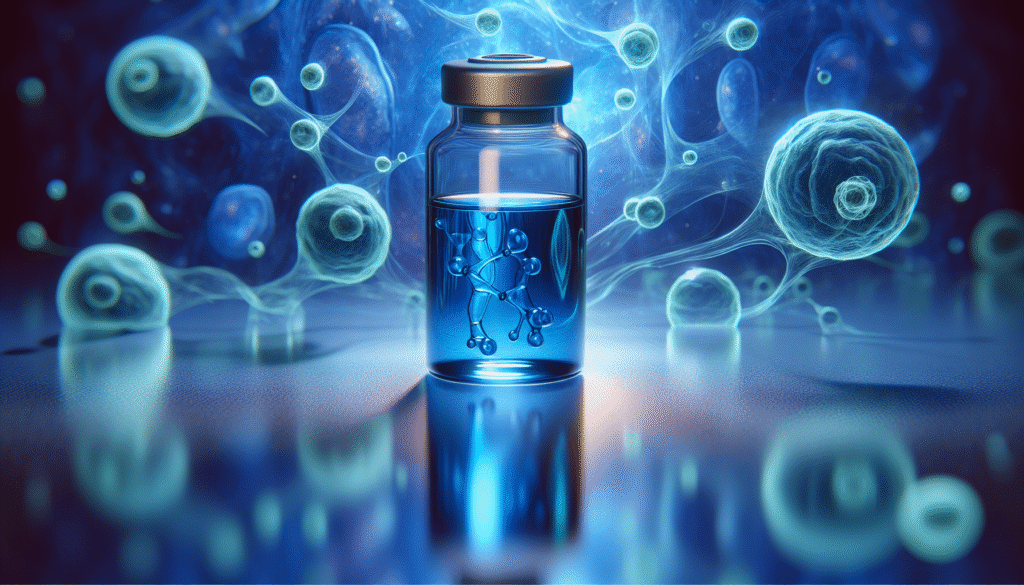
Have you ever wondered how certain compounds can influence cellular function and overall longevity? Recent research has positioned methylene blue as a promising agent in this arena, with intriguing implications for both cellular health and lifespan extension.
Understanding Methylene Blue
Methylene blue is a synthetic dye that has been utilized for various purposes since the late 19th century. Initially introduced to the medical field for its antiseptic properties, its potential has evolved significantly over time. You might find it surprising that methylene blue is now being studied for its ability to support cellular function, enhance cognitive performance, and improve metabolic health.
Historical Context
Originally developed as a textile dye, methylene blue has played a role in medicine for over a century. In the mid-20th century, it was recognized for treating conditions such as methemoglobinemia, a blood disorder where hemoglobin is unable to carry oxygen effectively. Its applications have expanded, demonstrating its versatility and potential therapeutic benefits.
How Methylene Blue Works at the Cellular Level
Understanding the mechanisms of methylene blue is key to appreciating its potential benefits. At its core, methylene blue serves as a redox agent, meaning it can accept and donate electrons in various biochemical processes. This attribute makes it an essential player in cellular respiration.
Mitochondrial Support
Mitochondria are often referred to as the powerhouses of cells, responsible for producing adenosine triphosphate (ATP), the energy currency of life. Methylene blue appears to enhance mitochondrial function by:
- Increasing ATP Production: Research indicates that methylene blue can boost ATP synthesis, which is vital for cellular energy.
- Reducing Oxidative Stress: By acting as an electron carrier, it helps in diminishing free radicals, thus protecting cells from oxidative damage.
Neuroprotective Effects
One of the most compelling areas of research regarding methylene blue is its potential neuroprotective effects. As you age, your neurons become increasingly susceptible to damage, impacting cognitive function and overall brain health.
- Cognitive Enhancement: Some studies suggest that methylene blue can enhance memory and learning capabilities, possibly due to its effects on mitochondrial function in neurons.
- Protecting Against Neurodegenerative Diseases: Preliminary animal studies indicate that methylene blue might play a role in protecting against conditions such as Alzheimer’s disease by mitigating amyloid plaque formation.
Role in Metabolism
Methylene blue has also gained attention for its impact on metabolic health. It can influence metabolic pathways, enhancing overall energy use and efficiency.
- Improving Insulin Sensitivity: Some research suggests that methylene blue can enhance glucose uptake in cells, which is crucial for maintaining healthy blood sugar levels.
- Promoting Fat Oxidation: By adjusting metabolic pathways, it may encourage fat utilization for energy, aiding in weight management.

Longevity and Aging
Given your interest in longevity and cellular health, the connection between methylene blue and aging is particularly noteworthy. As we age, cellular processes can become less efficient, leading to a decline in various bodily functions.
The Aging Process
Aging can be characterized by several biological processes, including:
- Cellular Senescence: The gradual deterioration of cellular function, contributing to age-related diseases.
- Telomere Shortening: The loss of protective caps on chromosomes, which can lead to decreased cell division and function.
Methylene blue has emerged as a topic of research in mitigating some of these age-related changes.
Anti-Aging Properties
Research into the anti-aging properties of methylene blue suggests that it may help to:
- Activate Cellular Repair Mechanisms: By promoting mitochondrial function, it could enhance the cell’s ability to repair and rejuvenate.
- Increase Lifespan in Model Organisms: Some studies on nematodes and mice have shown promising results, where methylene blue administration resulted in increased lifespan, holding potential implications for human health.
Safety and Dosage
While the potential benefits of methylene blue are compelling, understanding its safety profile is essential. As with any supplement or medication, proper dosage is crucial to optimizing its effectiveness while minimizing risks.
Recommended Dosage
While there is no universal dosage for methylene blue, studies have used varying amounts, typically ranging from 0.5 to 4 mg/kg body weight. It is imperative to consult with a healthcare professional before incorporating it into your regimen, particularly if you have underlying health conditions or are taking medication.
Possible Side Effects
Although generally considered safe at low doses, methylene blue can have side effects, including:
- Gastrointestinal Distress: Some individuals may experience nausea or stomach upset.
- Allergic Reactions: Though rare, some may develop skin rashes or other allergic responses.
- Interactions with Other Medications: Particularly those that affect serotonin levels, such as antidepressants, warrant caution and medical supervision.

Current Research Landscape
The integration of methylene blue into therapeutic protocols is still at a nascent stage, with ongoing studies exploring its vast potential. You may find the range of applications intriguing, stretching across various fields.
Clinical Trials
Several clinical trials are investigating methylene blue’s effects on:
- Neurodegenerative Diseases: Observing its role in cognitive function and protective outcomes in Alzheimer’s and Parkinson’s.
- Metabolic Disorders: Evaluating its efficacy in conditions like diabetes and obesity.
- Aging and Cellular Health: Researching its capacity to enhance lifespan and cellular resilience.
Future Directions
As research continues, the potential for methylene blue to support health and longevity expands. Future studies may include:
- Long-term Effects: Evaluating the impact of chronic methylene blue use over extended periods.
- Combination Therapies: Investigating how it might work synergistically with other compounds to enhance health outcomes.
Practical Applications
Integrating methylene blue into your lifestyle requires careful consideration of its form and method of use.
Available Forms
Methylene blue is available in several formulations, including:
- Liquid Solutions: Suitable for direct dosing or dilution in water.
- Tablets: Offering a more convenient delivery method.
- Topical Applications: Used for specific localized conditions.
Guidelines for Use
- Consultation: Speak to a healthcare provider to discuss potential benefits and risks.
- Dosing Strategy: Begin with lower doses to gauge tolerance.
- Monitoring: Track your response to methylene blue, noting any changes in physical or cognitive function.
Conclusion
With its fascinating history and growing body of research, methylene blue represents a significant development in the quest for enhanced cellular function and longevity. Its multifaceted mechanisms and potential applications offer promises not only for metabolic health but also for cognitive enhancement and longevity. As research unfolds, you have an opportunity to stay informed and make educated choices regarding your health. Prioritize thoughtful integration, always informed by evidence and professional guidance.
The journey toward unlocking the potential of compounds like methylene blue is ongoing. Your awareness and engagement with such advancements may play a crucial role in shaping a healthier, longer life.